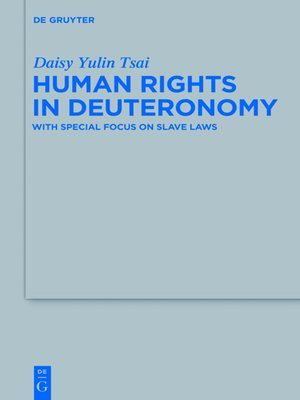Human Rights in Deuteronomy
ebook ∣ With Special Focus on Slave Laws · Beihefte zur Zeitschrift für die alttestamentliche Wissenschaft
By Daisy Yulin Tsai

Sign up to save your library
With an OverDrive account, you can save your favorite libraries for at-a-glance information about availability. Find out more about OverDrive accounts.
Find this title in Libby, the library reading app by OverDrive.



Search for a digital library with this title
Title found at these libraries:
| Library Name | Distance |
|---|---|
| Loading... |
The humanitarian concerns of the biblical slave laws and their rhetorical techniques rarely receive scholarly attention, especially the two slave laws in Deuteronomy. Previous studies that compared the biblical and the ANE laws focused primarily on their similarities and developed theories of direct borrowing. This ignored the fact that legal transplants were common in ancient societies. This study, in contrast, aims to identify similarities and dissimilarities in order to pursue an understanding of the underlying values promoted within these slave laws and the interests they protected. To do so, certain innovative methodologies were applied. The biblical laws examined present two diverse legal concepts that contrast to the ANE concepts: (1) all agents are regarded as persons and should be treated accordingly, and (2) all legal subjects are seen as free, dignified, and self-determining human beings. In addition, the biblical laws often distinguish an offender's "criminal intent," by which a criminal's rights are also considered. Based on these features, the biblical laws are able to articulate YHWH's humanitarian concerns and the basic concepts of human rights presented in Deuteronomy.







